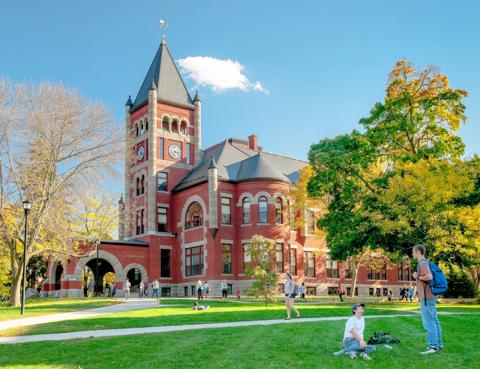The Communication Sciences and Disorders major at UNH focuses on helping individuals overcome speech, language, and hearing challenges. You'll gain a deep understanding of how communication develops. Engage in coursework, clinical observation, and research to build a strong foundation for a career or further studies in audiology, speech-language pathology, or cognitive science.
WHAT IS COMMUNICATION SCIENCES AND DISORDERS?
A major in Communication Sciences and Disorders (CSD) provides students with a foundation for careers helping children and adults to overcome difficulties related to speech, language, and hearing. In this program, students learn how the ability to communicate develops including how the brain and the speech and hearing mechanisms function to support the acquisition of speech, language, social communication, and cognition. Students review communication disorders that can affect individuals over a lifetime and learn about their diagnosis and treatment. This pre-professional degree will prepare you to successfully enter clinical or research graduate programs in areas such as audiology, speech-language pathology, cognitive science, or education.
WHY STUDY COMMUNICATION SCIENCES AND DISORDERS AT UNH?
As a student in the Communication Sciences and Disorders (CSD) program at UNH, you will learn about speech, language, and hearing disorders through engagement in coursework, clinical observation and research. Approximately 60 students per year are accepted into the program and this class size allows students to develop close connections with their peers and the faculty. Faculty have diverse professional and academic backgrounds and specialized expertise. They are committed to providing a supportive learning environment. Students are encouraged to fully engage in the university community and to take advantage of the organizations, study abroad programs, athletics, and other opportunities available to them.
POTENTIAL CAREERS
- Speech-language pathologist
- Audiologist
- Consultant
- Researcher
- Special education teacher
- Teacher of the deaf
- Cognitive scientist
- Neuroscientist
From the CHHS Blog
Curriculum & Requirements
The Department of Communication Sciences and Disorders offers a Bachelor of Science degree in Communication Sciences and Disorders. Communication Sciences and Disorders is the profession devoted to assessing and treating disorders, delays, or differences in speech, language, and hearing. In this program, students study how the ability to communicate develops as well as review an array of communication disorders that can affect individuals across the lifespan. Students learn about speech, language, and hearing through a unique model of education, observation, and research. This pre-professional degree will prepare you to successfully enter clinical or research graduate programs in areas such as audiology, speech-language pathology, cognitive science, or education.
Sample Degree Plan
This sample degree plan serves as a general guide; students collaborate with their academic advisor to develop a personalized degree plan to meet their academic goals and program requirements.
| First Year | ||
|---|---|---|
| Fall | Credits | |
| COMM 420 | Survey of Communication Disorders | 4 |
| PSYC 401 | Introduction to Psychology | 4 |
| BMS 507 | Human Anatomy and Physiology I | 0-4 |
| LING 405 | Introduction to Linguistics | 4 |
| Credits | 12-16 | |
| Spring | ||
| MATH 420 | Finite Mathematics | 0-4 |
| PHYS 409 | Investigating Physics | 4 |
| Credits | 4-8 | |
| Second Year | ||
| Fall | ||
| COMM 521 | Anatomy and Physiology of the Speech and Hearing Mechanisms | 4 |
| COMM 524 | Clinical Phonetics | 4 |
| PSYC 402 | Statistics in Psychology | 4 |
| Credits | 12 | |
| Spring | ||
| COMM 636 | Speech and Hearing Science | 4 |
| COMM 522 | Language Acquisition | 4 |
| PSYC 581 | Child Development | 4 |
| Credits | 12 | |
| Third Year | ||
| Fall | ||
| COMM 401 | American Sign Language I | 4 |
| COMM 504 | Basic Audiology | 4 |
| KIN 706 & KIN 707 | Neurology and Neurology Lab | 6 |
| Credits | 14 | |
| Fourth Year | ||
| Fall | ||
| COMM 741 | Speech-Language Pathology I | 4 |
| COMM 723 | Observation Skills in Speech-Language Pathology | 2 |
| COMM 724 or COMM 799 | Senior Capstone or Honors Thesis | 4 |
| Credits | 10 | |
| Spring | ||
| COMM 742 | Speech-Language Pathology II | 4 |
| COMM 705 | Introduction to Aural Rehabilitation | 4 |
| Credits | 8 | |
| Total Credits | 72-80 | |
Degree Requirements
All Major, Option and Elective Requirements as indicated.
*Major GPA requirements as indicated.
Major Requirements
Candidates for a bachelor’s degree in Communication Sciences and Disorders must satisfy all departmental as well as UNH Discovery and Writing Intensive requirements.
Students must earn a grade of C or better in all COMM courses.
| Code | Title | Credits |
|---|---|---|
| Required Courses | ||
| COMM 401 | American Sign Language I | 4 |
| PSYC 401 | Introduction to Psychology | 4 |
| PSYC 402 | Statistics in Psychology | 4 |
| LING 405 | Introduction to Linguistics | 4 |
| PHYS 409 | Investigating Physics | 4 |
| COMM 420 | Survey of Communication Disorders | 4 |
| MATH 420 | Finite Mathematics | 4 |
| COMM 504 | Basic Audiology | 4 |
| BMS 507 | Human Anatomy and Physiology I | 4 |
| COMM 521 | Anatomy and Physiology of the Speech and Hearing Mechanisms | 4 |
| COMM 522 | Language Acquisition | 4 |
| COMM 524 | Clinical Phonetics | 4 |
| PSYC 581 | Child Development | 4 |
| COMM 636 | Speech and Hearing Science | 4 |
| COMM 705 | Introduction to Aural Rehabilitation | 4 |
| KIN 706 & KIN 707 | Neurology and Neurology Lab | 6 |
| COMM 723 | Observation Skills in Speech-Language Pathology (satisfies 25 Observation Hours) | 2 |
| COMM 741 | Speech-Language Pathology I | 4 |
| COMM 742 | Speech-Language Pathology II | 4 |
| Capstone | ||
| COMM 724 | Senior Capstone | 4 |
| or COMM 799 | Honors Thesis | |
| Total Credits | 80 | |
CSD welcomes transfer students. We are committed to helping you keep to your intended graduation timeline; however, this is dependent upon what courses you have completed before transfer. UNH undergraduates who have not declared a major and/or are interested in transferring into communication sciences and disorders (CSD) should apply directly to the department by completing an internal transfer application. Applications may be submitted any time during the academic year. Acceptance into CSD is dependent upon space and the applicant's academic credentials.
Internal Transfer students - Apply Now
For any questions regarding CSD curriculum please email the department at csd.department@unh.edu.
Program Learning Outcomes
- The Communication Sciences and Disorders (CSD) undergraduate curriculum aligns with the American Speech Language Hearing Association (ASHA) standards.
- Students completing required COMM courses will have the foundational knowledge to meet ASHA standards.
- Students completing required COMM courses will have the academic preparation to apply to either SLP or Audiology graduate programs.
- All CSD students will have a capstone experience which will allow them to integrate academic experiences.
- Students will be introduced to evidence-based practice (EBP) as it relates to the professions of speech language pathology and audiology.
Explore Program Details
The UNH Office of Admissions reviews applications of all incoming Freshmen who wish to major in Communication Sciences and Disorders. Students are admitted to the program based on their academic records.
The Office of Admissions website contains complete campus visit information and online visitor registration. It also contains admission criteria and important dates, as well as an online application.
CSD welcomes internal transfer applicants. Prior to submitting an application, students are encouraged to review the major requirements and the CSD suggested course schedule. If accepted, every effort will be made to help transfer students stay on track for their intended graduation date, but this is not guaranteed.
Guidelines:
1. A GPA of 3.0 or higher.
2. Students with a Cumulative GPA below 3.0 are welcome to apply, but must meet an additional requirement of a final grade of B or above in COMM 420 prior to an acceptance decision.
3. Each application is reviewed on an individual basis. Exceptions to the guidelines may occur at the discretion of the Undergraduate Committee.
4. Applications may be submitted any time during the academic year.
Students interested in our Communication Sciences and Disorders Major major may also be interested in these advanced degree offerings:















